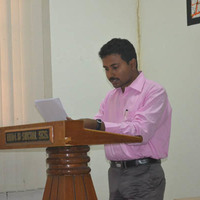
Amardeep Singh
After studying at Cornell and Tufts, I received my Ph.D. from Duke University in 2001. My first book, "Literary Secularism: Religion and Modernity in Twentieth-Century Fiction" was published in 2006 by Cambridge Scholars Press. My second book, "The Films of Mira Nair: Diaspora Verite," was published by University Press of Mississippi in 2018.
My primary interests include Postcolonial Literature in English, 20th/21st Century British literature, and the Digital Humanities.
Recent courses I have taught include "Global English," "Introduction to Digital Humanities," "New Brown America: Race and Immigration in the 21st Century," "Converts and Rebels: Religion and British Modernism," and "What Am I Doing Here? The Value of a Liberal Arts Education").
I have published essays in journals such as Minnesota Review, Symploke, the Journal of Postcolonial Writing, South Asian Review, Criticism: A Quarterly, Wasafiri, The Journal of Commonwealth and Postcolonial Studies, Semeia, and Himal Southasian. I have also served as a reviewer for a number of journals, including PMLA, Twentieth-Century Fiction, South Asian Review, and Ariel.
Address: English Department, Lehigh University
35 Sayre Drive
Bethlehem, PA 18015
USA
My primary interests include Postcolonial Literature in English, 20th/21st Century British literature, and the Digital Humanities.
Recent courses I have taught include "Global English," "Introduction to Digital Humanities," "New Brown America: Race and Immigration in the 21st Century," "Converts and Rebels: Religion and British Modernism," and "What Am I Doing Here? The Value of a Liberal Arts Education").
I have published essays in journals such as Minnesota Review, Symploke, the Journal of Postcolonial Writing, South Asian Review, Criticism: A Quarterly, Wasafiri, The Journal of Commonwealth and Postcolonial Studies, Semeia, and Himal Southasian. I have also served as a reviewer for a number of journals, including PMLA, Twentieth-Century Fiction, South Asian Review, and Ariel.
Address: English Department, Lehigh University
35 Sayre Drive
Bethlehem, PA 18015
USA
less
Related Authors
Joseph Lennon
Villanova University
Jihee Han
Gyeongsang National University
Carl O'Brien
National University of Ireland, Maynooth
Ishrat Nadia
University of Dhaka, Bangladesh
Michael P Collins
University College London
InterestsView All (8)









Uploads
Papers by Amardeep Singh
Writers, 1900–1922,” aims to digitize and annotate a limited array of
primary texts, mainly poetry, and present these materials as a digital
archive in the Scalar platform. The project aligns with what Kim
Gallon has referred to as a “technology of recovery,” which is one
of the core principles bridging African American literary studies
and the digital humanities. The project uses Scalar’s visualization
and tagging structures to explore stylistic, thematic, and social
relationships among a small group of writers, as well as to explore
the conversations these writers were having with established
writers and editors. Several key themes have begun to emerge as
the project has developed. The first of these is the confrontation
with American racism, which impacted African American
communities intensely in the 1910s; and these poets document
the emergence of racial violence and the response to that violence.
Second, these poets show how the role of African American
motherhood was evolving in the early years of the twentieth century, in part because of the stresses of raising children in a
racist society. Third, the black Church became strongly connected
to the movement for social justice at this time; and several, if not
most, of the writers in this archive explored Christian themes in
their anti-racist writing.
approximately thirty years (roughly 1870–1900), and all four
Kiplings (Rudyard, Lockwood Kipling, Alice MacDonald Kipling,
and Alice Fleming) published writing based on that experience.
As postcolonial readers of Rudyard Kipling’s work in particular
have often pointed out, their representation of life in the British
Raj was highly ideological and often quite limited. For that reason, my digital thematic collection, "The Kiplings and India: A
Collection of Writings from British India," balances the presentation of digital editions of texts by the Kiplings themselves with
writing by contemporary Indian reformers and activists like
Pandita Ramabai, Rukhmabai, Behramji Malabari, and Dadabhai
Naoroji. The project is being built in the Scalar platform, and
Scalar’s visualization and path frameworks help users learn about
a series of thematic debates in British Indian life: the famines,
women’s rights under civil law (especially marriage law and the
rights of widows), and the advent of the Indian nationalist movement. Here I will explore texts focusing on one particular thematic
thread, the differential representation of late nineteenth-century
Indian famines in writings by the Kiplings as well as Pandita
Ramabai, Naoroji, and others
Writers, 1900–1922,” aims to digitize and annotate a limited array of
primary texts, mainly poetry, and present these materials as a digital
archive in the Scalar platform. The project aligns with what Kim
Gallon has referred to as a “technology of recovery,” which is one
of the core principles bridging African American literary studies
and the digital humanities. The project uses Scalar’s visualization
and tagging structures to explore stylistic, thematic, and social
relationships among a small group of writers, as well as to explore
the conversations these writers were having with established
writers and editors. Several key themes have begun to emerge as
the project has developed. The first of these is the confrontation
with American racism, which impacted African American
communities intensely in the 1910s; and these poets document
the emergence of racial violence and the response to that violence.
Second, these poets show how the role of African American
motherhood was evolving in the early years of the twentieth century, in part because of the stresses of raising children in a
racist society. Third, the black Church became strongly connected
to the movement for social justice at this time; and several, if not
most, of the writers in this archive explored Christian themes in
their anti-racist writing.
approximately thirty years (roughly 1870–1900), and all four
Kiplings (Rudyard, Lockwood Kipling, Alice MacDonald Kipling,
and Alice Fleming) published writing based on that experience.
As postcolonial readers of Rudyard Kipling’s work in particular
have often pointed out, their representation of life in the British
Raj was highly ideological and often quite limited. For that reason, my digital thematic collection, "The Kiplings and India: A
Collection of Writings from British India," balances the presentation of digital editions of texts by the Kiplings themselves with
writing by contemporary Indian reformers and activists like
Pandita Ramabai, Rukhmabai, Behramji Malabari, and Dadabhai
Naoroji. The project is being built in the Scalar platform, and
Scalar’s visualization and path frameworks help users learn about
a series of thematic debates in British Indian life: the famines,
women’s rights under civil law (especially marriage law and the
rights of widows), and the advent of the Indian nationalist movement. Here I will explore texts focusing on one particular thematic
thread, the differential representation of late nineteenth-century
Indian famines in writings by the Kiplings as well as Pandita
Ramabai, Naoroji, and others